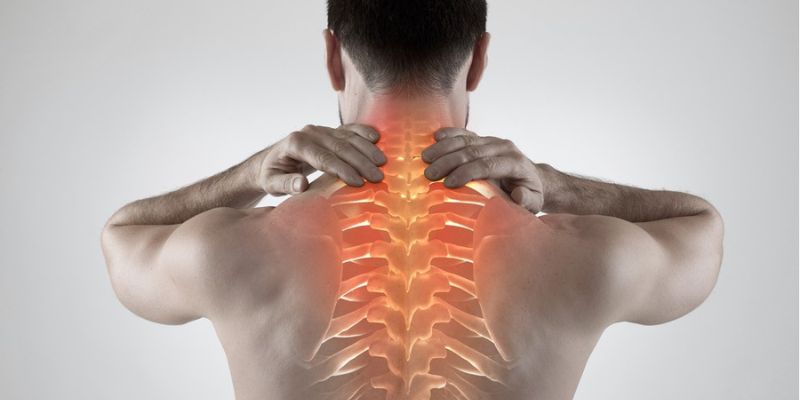Spotting The Warning Signs Of A Herniated Disc

The early diagnosis and rapid treatment of a herniated disc are essential for avoiding subsequent consequences. A herniated disc, sometimes referred to as a slipped disc or a ruptured disc, is a common spinal disorder that can be extremely painful and uncomfortable. When a spinal disc’s soft inner core pokes through the outer covering, it causes symptoms by pressing on adjacent nerves. In this article, we will explore the common warning signs of a herniated disc, including its causes, symptoms, and risk factors.
The spine is made up of a series of bones called vertebrae, separated by small cushions known as discs. These discs act as shock absorbers and allow for smooth movement of the spine. However, over time, wear and tear or injury can weaken the outer layer of a disc, leading to a herniated disc.
Natural remedies, such as stretches, exercises, and lifestyle modifications, may be able to help you get a slipped disc back in place and feel less pain as a result.
Whether you are experiencing back pain or simply want to be informed about spine health, this article will provide you with valuable insights into the warning signs of a herniated disc and help you take proactive steps towards better spine care.
What causes a herniated disc?
One of the most common causes of a herniated disc is age-related degeneration. As we age, the discs in our spine lose moisture and become less flexible, making them more prone to herniation. Additionally, repetitive activities that involve lifting, twisting, or bending can increase the risk of developing a herniated disc. Other factors include obesity, genetics, and a sedentary lifestyle.
Although herniated discs in the lower back are the most frequently occurring type, it is also possible for individuals to experience herniation in higher areas, such as the neck.
The warning signs of a Herniated Disc
The warning signs of a herniated disc can vary depending on the location and severity of the herniation. Here are some common signs to look out for:
Back Pain
Pain in the lower back is one of the most common warning signs of a herniated disc. The pain may be sharp, shooting, or stabbing, and it may worsen with movement or prolonged sitting or standing. The pain may also radiate down the buttocks, thighs, and legs, following the path of the compressed nerve.
Insensitivity
Compression of a nerve by a herniated disc can also cause Insensitivity in the affected area. This may be felt as a “pins and needles” sensation, and it can occur in the lower back, buttocks, thighs, legs, or feet. Insensitivity may be intermittent or constant, depending on the severity of the herniation.
Muscle Weakness
If the herniated disc is pressing on a nerve that controls muscle function, it can result in muscle weakness. This may manifest as difficulty lifting objects, walking, or performing other activities that require strength. Muscle weakness is often accompanied by other symptoms such as pain and numbness.
Changes in Reflexes
A herniated disc can also affect reflexes. Reflexes are involuntary responses of the body to stimuli, and changes in reflexes can indicate nerve compression. For example, if the knee jerk reflex is diminished or absent, it may be a sign of a herniated disc affecting the nerves in the lower back.
Loss of Bladder or Bowel Control
In rare cases, a severe herniated disc can compress nerves that control bladder or bowel function, leading to loss of control. This is a serious symptom that requires immediate medical attention, as it can indicate a medical emergency.
Pain Aggravated by Coughing, Sneezing, or Straining
Activities that increase pressure in the abdomen, such as coughing, sneezing, or straining during bowel movements, can aggravate the pain caused by a herniated disc. If you notice that your back pain worsens with these activities, it may be a signs of a herniated disc.
Pain that Persists for Weeks
While back pain is common and often resolves on its own within a few days to weeks, persistent pain that lasts for several weeks despite conservative treatments such as rest, ice, and over-the-counter pain medications may be a warning sign.
In addition to the physical symptoms, there are also certain risk factors that can increase your likelihood of developing a herniated disc. These risk factors include age, as the discs in the spine tend to degenerate with age, and older adults are more prone to herniated discs.
Poor posture, improper lifting techniques, and repetitive activities that strain the spine can also increase the risk of developing a herniated disc. Obesity, which puts excess pressure on the spine, and a family history of herniated discs are also risk factors to consider.
It’s important to note that the symptoms of a herniated disc can vary greatly depending on the location and severity of the herniation. Some people may experience mild symptoms that resolve on their own with conservative treatment. But, others may have more severe symptoms that require medical intervention. Therefore, it’s crucial to pay attention to your body and seek medical attention if you notice any warning signs of a herniated disc.
What should you do if you suspect you may have a herniated disc?
The first step is to see a healthcare professional, such as a primary care physician or a spine specialist. They will evaluate your symptoms, perform a physical examination, and may order imaging tests such as X-rays, MRI, or CT scans to confirm the diagnosis. Based on the severity of your symptoms and the location of the herniated disc, your healthcare provider may recommend conservative treatments such as rest, pain medications, physical therapy, and corticosteroid injections to help manage the pain and reduce inflammation.
If conservative treatments are not effective or if the herniated disc is causing significant neurological symptoms such as weakness or loss of bladder or bowel control, your healthcare provider may recommend more aggressive treatments such as spinal decompression surgery or minimally invasive procedures like epidural steroid injections or nerve root blocks.
FAQS
Q: What is a herniated disc?
A: A herniated disc, also known as a slipped or ruptured disc, occurs when the soft, gel-like center of a spinal disc pushes through a crack or tear in the tough outer layer, causing it to bulge or protrude.
Q: How is a herniated disc diagnosed?
A: A herniated disc is typically diagnosed through a combination of medical history review, physical examination, and imaging tests such as X-rays, MRI (magnetic resonance imaging), or CT (computed tomography) scans.
Q: Can a herniated disc heal on its own?
A: In many cases, a herniated disc can heal on its own with conservative treatment measures such as rest, physical therapy, and medications. However, it may take time and varies from person to person. It is important to follow a healthcare professional’s guidance and recommendations for proper management.
Q: What precautions should I take to prevent a herniated disc?
A: To reduce the risk of developing a herniated disc, it is important to maintain a healthy lifestyle, including regular exercise to strengthen the core muscles that support the spine, maintaining a healthy weight, practicing proper body mechanics when lifting heavy objects, avoiding prolonged sitting or standing in one position, and avoiding smoking which can weaken the discs in the spine.
Q: Can a herniated disc cause permanent damage?
A: In some cases, a herniated disc can cause permanent damage, such as nerve damage or loss of function in the affected area, if left untreated or if the condition is severe. It is important to seek proper medical evaluation and treatment to prevent potential complications. However, with appropriate and timely medical care, many people with herniated discs can recover and manage their condition effectively.
You May Also Like:
How To Protect Your Knees During Exercise?
How to use yoga blocks in your practice
Conclusion
In conclusion, recognizing the warning signs of a herniated disc is crucial for early diagnosis and treatment. It is important to be vigilant and attentive to symptoms such as back pain, numbness, tingling, weakness, and changes in bowel or bladder function. Seeking prompt medical attention and following appropriate treatment protocols can help prevent further damage and improve outcomes.
Remember to practice good posture, maintain a healthy lifestyle, and avoid heavy lifting or repetitive activities that can strain the spine. If you suspect you may have a herniated disc, don’t ignore the warning signs, but rather consult a healthcare professional for evaluation and management.
Early intervention can make a significant difference in managing the condition effectively and improving your quality of life.



